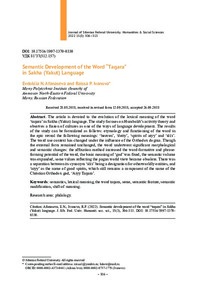Semantic Development of the Word “Tаŋаra” in Sakha (Yakut) Language
Скачать файл:
URI (для ссылок/цитирований):
https://elib.sfu-kras.ru/handle/2311/106698Автор:
Afanas’eva, Evdokiya N.
Ivanova, Raissa P.
Афанасьева, Е.Н.
Иванова, Р.П.
Дата:
2018Журнал:
Журнал Сибирского федерального университета. Гуманитарные науки. Journal of Siberian Federal University. Humanities & Social Sciences; 2018Аннотация:
The article is devoted to the evolution of the lexical meaning of the word ‘taŋara’ in Sakha (Yakut) language. The study focuses on Humboldt’s activity theory and observes a fusion of cultures as one of the ways of language development. The results of the study can be formulated as follows: etymology and functioning of the word in the epic reveal the following meanings: ‘heaven’, ‘deity’, ‘spirits of aiyy’ and ‘ičči’. The word use context has changed under the influence of the Orthodox dogma. Though the external form remained unchanged, the word underwent significant morphological and semantic changes: the affixation method increased the word-formative and phrase-forming potential of the word, the basic meaning of ‘god’ was fixed, the semantic volume was expanded, some values reflecting the pagan world view became obsolete. There was a separation between its synonym ‘ičči’ being a designation for otherworldly entities, and ‘aiyy’ as the name of good spirits, which still remains a component of the name of the Christian Orthodox god, ‘Aiyy Taŋara’ Статья посвящена изучению эволюции лексического значения слова ‘таҥара’ в якутском языке. Рассматривается этимология, функционирование слова в эпическом тексте, проводится анализ данных толковых и фразеологических словарей, выпущенных
в разное время. Слово ‘таҥара’ восходит к древнетюркскому täŋri и до ХХ века сохраняет значение ‘небо, божество’. Внешняя и внутренняя формы лексемы свидетельствуют о наличии следов древних языческих верований (тэнгрианства, шаманизма).
Поздние словари фиксируют значения, отображающие реалии православного христианства и замену первичного значения на ‘бог’, значение ‘небо’ отходит на второй план.
Значения, обозначающие ранние верования, перешли в ранг устаревших. Бог больше
не тождественный духу в языческом понимании, а персонифицированный иконический
образ. Изменение контекстуального окружения слова привело к активизации аффиксов, что способствовало образованию глагола, имени прилагательного и других имен
существительных. Заимствования из русского языка увеличили фразообразовательный потенциал слова; большинство фразеологических единиц с компонентом ‘таҥара’
образованы способом калькирования. Анализ показал, что изменения семантики слова
‘таҥара’ коснулись всех уровней языка. Семантические преобразования обусловлены
внешними факторами, влиянием русской культуры через распространение среди якутов православного религиозного учения
Коллекции:
Метаданные:
Показать полную информациюСвязанные материалы
Показаны похожие ресурсы по названию, автору или тематике.
-
The Problem of Identifying the Semantic Situation of Apology (Based on Modern British Literature)
Dubovik, Anastasiya S.; Дубовик, А.С. (Сибирский федеральный университет. Siberian Federal University., 2016-03)As far as is known, speech means of apology are used in natural communication in many, if not all, linguocultures. The formulas of apologies fulfil an important social function that is the restoration of social balance ... -
Semantic Situation and its Representation in the Texts of Different Genres
Tarasenko, Tatiana V.; Quero Gervilla, Enrique F.; Тарасенко, Т.В.; Керо Хервилья, Энрике Федерико (Сибирский федеральный университет. Siberian Federal University., 2016-03)In this paper the authors analyzed the semantic situation and its representation in accordance with the text type, namely, urban folklore texts – anecdotes (jokes) and fiction. The authors focused mainly on the situation ... -
Variability of News Interpretation in Political Discourse (A Case Study of the Internet Materials Covering the 2014 and 2018 Winter Olympic Games)
Golev, Nikolay D.; Kim, Lidiya G.; Saveleva, Irina V.; Голев, Н. Г.; Ким, Л. Г.; Савельева, И. В. (Сибирский федеральный университет. Siberian Federal University, 2021-04)This paper focuses on the analysis of the discourse formed by the ordinary citizens discussing news on the Internet social networks. Conceptualizing the theory of the variability of interpretation, the authors study political ... -
Two “Characters” in the Russian Linguistic Worldview: “We” and “They”
Revenko, Inna V.; Osetrova, Elena V.; Ревенко, И.В.; Осетрова, Е.В. (Сибирский федеральный университет. Siberian Federal University, 2019-12)The article reconstructs semantic context (evaluation, movement, actions, etc.) of WE and THEY – two usual subjects of the Russian linguistic worldview. Monologues and dialogues recently collected in Krasnoyarsk reveal ... -
Лингвоаксиологическая модель идеального учителя в представлении преподавателей и студентов педагогического колледжа
Васильева, С. П.; Васильев, А. Д.; Vasilievа, Svetlana P.; Vasiliev, Alexandr D. (Journal of Siberian Federal University. Сибирский федеральный университет, 2024-04)Статья посвящена описанию результатов социолингвистического эксперимента среди педагогов и выпускников педагогического колледжа. В условиях реформирования образования в России важно проанализировать сложившуюся ситуацию ...

